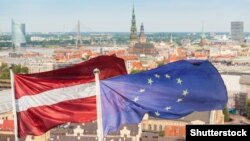In an interview with Pravda.ru released on February 6, the head of the pro-Russian organization “Russian Dawn,” Illarion Girss, claimed that ethnic “Russians experience apartheid in Latvia."
The Republic of Latvia, formerly under the control of the Soviet Union as the Latvian Soviet Socialist Republic, has a large number of residents (approximately 11.75% of the population) who live in the country but do not hold Latvian citizenship. The majority of them are ethnically Russian.
When the Soviet Union splintered, ethnic Russians were stuck in the Baltic states and defined as "non-citizens" without passports.
However, a majority of ethnically Russian residents of Latvia are citizens of the country, according to a March 2014 article in the Financial Times. Currently there are 26 percent ethnic Russians living in Latvia and 63 percent of them are Latvian citizens, according to national statistics.
And some hold prominent posts. The mayor of the Latvian capital of Riga, Nils Usakovs, is ethnically Russian.
And the number of ethic Russian non-citizens is dropping.
According to the Latvian Ministry of Foreign Affairs, “the percentage of non-citizens fell to 12 percent (257,377) in July 2015 compared to 29 percent (approximately 730,000) in 1995,” when Latvia began offering naturalization to non-citizen permanent residents
Children born to non-citizen permanent residents of Latvia are granted Latvian citizenship upon the request of at least one parent.
Through a process that was streamlined by changes in law in 2013, non-citizen permanent residents can receive citizenship after passing a basic Latvian language test and Latvian history test and by pledging their loyalty to Latvia.
The Latvian Ministry of Foreign Affairs maintains a website with more extensive information on the country’s citizenship and language policies, available in English, Latvian, and Russian.
Timofey Agarin, director of the Centre for the Study of Ethnic Conflicts at Queen’s University Belfast, is quoted by the Financial Times as saying “minorities are being treated justly.
"They are not being purposefully discriminated against,” he said.
In a 2014 report in the Journal on Ethnopolitics and Minority Issues in Europe, Ada-Charlotte Regelmann, also of Queen’s University Belfast, said some structural social and political inequalities between Latvian and Russian residents of the country remain.
But “over time, and under the conditionality pressure exerted by the international organizations...‘aliens’ were granted various rights (including the right to vote, though not to be elected, in local elections) and legal protection (such as when traveling abroad)," he wrote.
"Today, the status of aliens differs from that of citizens primarily with regard to their political rights," Regelmann wrote.
Latvian officials say Russian activist Girss has no credibility.
Aris Vigants, the political counselor at the Latvian Embassy in Washington said in a statement to Polygraph.info: "Illarion Girss, an ultra radical pro-Russia activist in Latvia and a leader of Russkaja Zarja organization, is a notoriously well known person to the Latvian law enforcement agencies and to the larger public because of his hate speech, calls for separatism and other instances of anti-constitutional, illegal behavior.
"In 2016, a court trial was started against him for instigating national hatred," Vigants said. "Several criminal procedures against him initiated by the State`s Security Police also were launched earlier."
As for Girss' apartheid claims, Vigants said: "The use of terms 'apartheid'...is deplorable, and questions seriousness and credibility of his statements. In 1992, Latvia ratified the International Convention on the Elimination of All Forms of Racial Discrimination and abides by its provisions. Needless to say, there is no segregation or separation of any kind in Latvia."
Polygraph.info contacted several scholars from the Latvian Institute for International Affairs who said Girss' claims have no merit.





